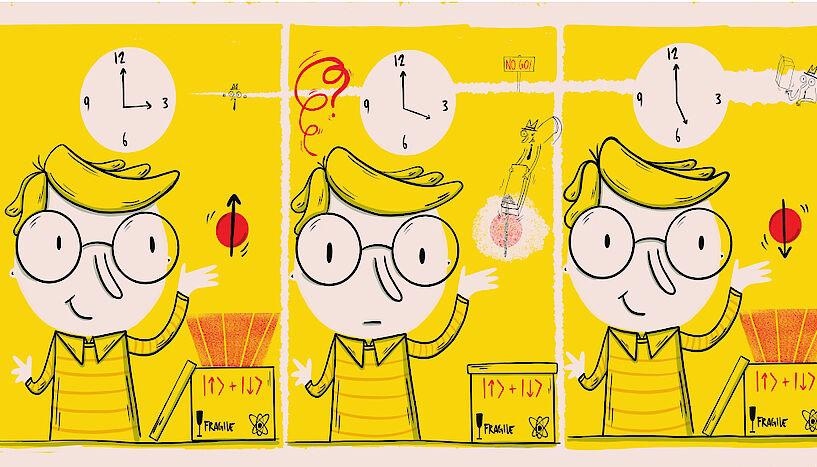May 17 2021
Quantum mechanics is well known for its indeterminism but probabilities can generally be used to measure one’s uncertainty about upcoming observations.
 An observer (Wigner’s friend) performs a quantum measurement on a spin system. Later, Wigner measures the friend and spin in an entangled basis. As a consequence of this measurement, not only does the friend not reliably remember his past observed outcome but cannot even quantify this ignorance with a reasonably behaved probability distribution. Image Credit: © Aloop, IQOQI-Wien, Österreichische Akademie der Wissenschaften.
An observer (Wigner’s friend) performs a quantum measurement on a spin system. Later, Wigner measures the friend and spin in an entangled basis. As a consequence of this measurement, not only does the friend not reliably remember his past observed outcome but cannot even quantify this ignorance with a reasonably behaved probability distribution. Image Credit: © Aloop, IQOQI-Wien, Österreichische Akademie der Wissenschaften.
But a research team from the University of Vienna, the Institute of Quantum Optics and Quantum Information (IQOQI-Vienna) of the Austrian Academy of Sciences, and the Perimeter Institute for Theoretical Physics has now demonstrated that such probabilistic predictions may not be made in certain extreme quantum situations, provided that some major hypothesis of quantum mechanics remain true.
Published in the Communications Physics journal, the study provides a better insight into the debate regarding the understanding of quantum mechanics.
Back in 1961, Eugene Wigner—a theoretical physicist who won the Nobel prize—suggested the so-called “Wigner’s friend” thought experiment as an extension of the infamous Schroedinger’s cat experiment. In the latter experiment, a cat is ensnared in a box containing a poison that will be discharged upon the decay of a radioactive atom.
The radioactive atom, which is controlled by quantum mechanical laws, remains in a superposition between decaying and not decaying states, which also implies that the cat remains in a superposition between life and death.
But it is not known what exactly the cat goes through when it remains in this superposition. Wigner refined the question by driving quantum theory to its theoretical limitations. He explored what actually takes place when an observer also has quantum characteristics.
In their new article published in the Communications Physics journal, the researchers headed by Caslav Brukner from the University of Vienna, the IQOQI-Vienna of the Austrian Academy of Sciences, and the Perimeter Institute for Theoretical Physics explored the limitations that the “Wigner’s friend” thought experiment enforced on an observer’s potential to estimate his or her own upcoming observations.
As such, researchers identified several assumptions, all conventionally believed to be at the heart of quantum formalism. These assumptions allow observers in normal experimental scenarios to estimate the probabilities for upcoming results based on their previous experiences.
These assumptions limit the probabilities to follow the quantum mechanical laws. But the investigators demonstrated that such assumptions for Wigner’s friend cannot be fully met in the thought experiment.
The new study raises some crucial queries about the “persistent reality” of the friend’s perceptions. The researchers indeed demonstrated that in a Wigner’s friend situation, it is not possible to account for the friend’s perceptions to be coexistent at varying points in time.
This makes it dubious whether a quantum observer can generally consider their own future or past experiences to be as tangible as their current ones.
Our work shows that at least one of three key assumptions of quantum mechanics must be violated; which one depends on your preferred interpretation of quantum mechanics.
Philippe Allard Guérin, Study Lead Author, University of Vienna
Journal Reference:
Guérin, P. A., et al. (2021) A no-go theorem for the persistent reality of Wigner’s friend’s perception. Communications Physics. doi.org/10.1038/s42005-021-00589-1.